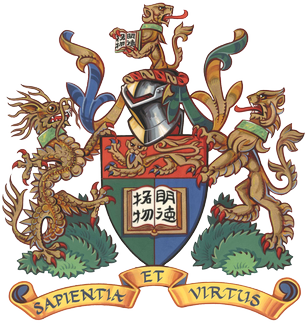
The University of Hong Kong (HKU) is a public research university in Pok Fu Lam, Hong Kong Island, Hong Kong.
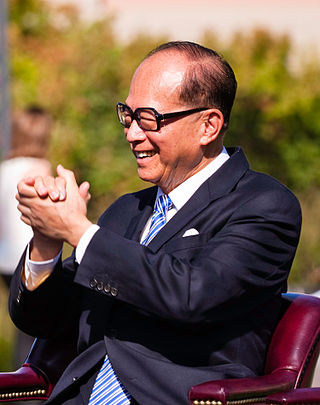
Sir Li Ka-shing is a Hong Kong billionaire business magnate, investor, and philanthropist. He is the senior advisor for CK Hutchison Holdings and CK Asset Holdings, after he retired from the Chairman of the Board in May 2018; through it, he is a port investor, developer, and operator of the largest health and beauty retailer in Asia and Europe. As of July 2023, Li is the 33rd richest person in the world, with an estimated net wealth of US$37.7 billion.

Wah Yan College Kowloon is a Catholic secondary school for boys run by the Chinese Province of the Society of Jesus. It is located in Kowloon, Hong Kong and is a grant-in-aid secondary school using English as the primary medium of instruction. The total land area of its campus is among the largest for Hong Kong secondary schools, and it's one of the most prestigious schools in Hong Kong.

Prince of Wales Hospital is a regional acute government hospital located in Sha Tin, New Territories in Hong Kong. It is also a teaching hospital of the Faculty of Medicine of the Chinese University of Hong Kong (CUHK).

The Queen Mary Hospital is the largest district general hospital located in Pok Fu Lam on Hong Kong Island of Hong Kong. It is part of the teaching hospital of the Faculty of Dentistry and Li Ka Shing Faculty of Medicine of the University of Hong Kong. It has 1,706 beds. It provides general medical and surgical services to the residents of Western and Southern districts and is a tertiary referral centre for the whole territory of Hong Kong and beyond.
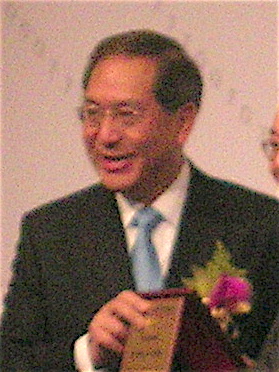
Arthur Li Kwok-cheung, GBM, GBS JP is a Hong Kong doctor and politician. He is currently member of the Executive Council of the Hong Kong Special Administrative Region and the chairman of the Council of the University of Hong Kong (HKU). He was Vice-Chancellor of the Chinese University of Hong Kong (CUHK) from 1996 to 2002 and Secretary for Education and Manpower from 2002 to 2007. Li’s dictatorial and ruthless leadership style led some to refer to him as "King Arthur" and even "the Tsar". He is the grandson of the co-founder of the Bank of East Asia, Li Koon-chun, and brother of its current chairman, David Li. He was awarded the Grand Bauhinia Medal (GBM) by the Hong Kong SAR Government in 2017.
Before the handover of Hong Kong to the People's Republic of China in 1997, medical education in this former British colony traditionally and exclusively followed the path of western medicine. Faculties of Medicine were modelled after those in the United Kingdom and the Commonwealth, and only doctors trained in western medicine Chinese medicine practitioners had no formal status at that time. However, after the return of the territory to China, the practice of traditional Chinese medicine was further regulated and schools of Chinese Medicine were set up within some of the government-funded tertiary institutions in Hong Kong. The first school of its kind, the School of Chinese Medicine at Hong Kong Baptist University, was established in 1998. Currently, there are two faculties with academic programmes in western medicine and three schools of Chinese Medicine in the territory.
Modern medical education in Hong Kong started with the founding of the Hong Kong College of Medicine for Chinese in 1887. Currently, six institutes of higher education are engaged in the training of medical practitioners in Hong Kong.

Hong Kong Sanatorium & Hospital, or HKSH, is a private hospital established in 1922 in Happy Valley, Hong Kong.
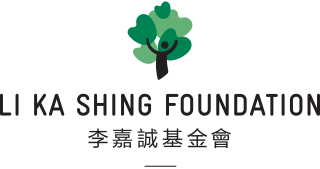
The Li Ka Shing Foundation is a Hong Kong-based charitable organization founded in 1980 by Hong Kong entrepreneur Li Ka-shing.

Hong Kong is one of the healthiest places in the world. Because of its early health education, professional health services, and well-developed health care and medication system, Hongkongers enjoy a life expectancy of 88 for females and 83 for men, which is the highest in the world, and an infant mortality rate of 1.169 deaths per 1,000 births, the lowest in the world. The proportion of the population over 65 years old is expected to grow from 14% in 2013 to 18% in 2018, and the number of people with a long-term condition is expected to increase by 33% over the same period.

Gabriel Matthew Leung is a Hong Kong physician and epidemiologist, currently serving as the executive director of the Hong Kong Jockey Club. From 2013 to 2022, he was the longest-serving Dean of Medicine at the University of Hong Kong, where he was also the inaugural Helen and Francis Zimmern Professor in Population Health. Formerly, he was Hong Kong's first Under Secretary for Food and Health and fifth Director of the Office of the Chief Executive at the Government of Hong Kong.
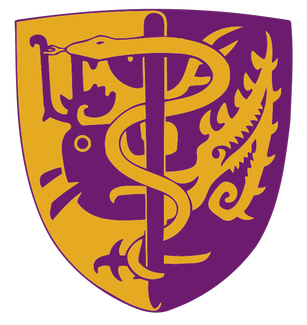
The Faculty of Medicine of the Chinese University of Hong Kong is the medical school of the Chinese University of Hong Kong. It was established in 1981 and consists of five schools offering undergraduate and postgraduate programmes in the field of medicine, nursing, pharmacy and public health. The Prince of Wales Hospital is the faculty's teaching facility and base of research. CUHK is a bilingual university; in general, courses are taught in English and/or Chinese.
The Faculty of Arts of The University of Hong Kong (HKU) is one of the oldest faculty in the University of Hong Kong, and is considered to be one of Asia's best Arts and Humanities faculties.

Emily Ying Yang Chan is a clinical humanitarian doctor and global academic expert in public health and humanitarian medicine based in Hong Kong. She is Assistant Dean and Professor of the Chinese University of Hong Kong Faculty of Medicine, Professor at the Jockey Club School of Public Health and Primary Care, Director at the Centre for Global Health (CGH), Director of the Collaborating Centre for Oxford University and CUHK for Disaster and Medical Humanitarian Response (CCOUC), Director of the Centre of Excellence (ICoE-CCOUC) of Integrated Research on Disaster Risk (IRDR), Visiting Professor of Public Health Medicine at the Oxford University Nuffield Department of Medicine, Fellow at Harvard University FXB Center for Health and Human Rights, Honorary Professor at University of Hong Kong Li Ka Shing Faculty of Medicine, and Fellow at Hong Kong Academy of Medicine. She was appointed CEO of the GX Foundation in 2019.

Sophia Chan Siu-chee is a Hong Kong professor and politician. She served as Secretary for Food and Health from 2017 to 2022.
George Sai Wah Tsao was a professor of the School of Biomedical Sciences of the University of Hong Kong and the Director of the Faculty Core Facility of the Faculty of Medicine, the University of Hong Kong. Tsao researches the relationship between Epstein-Barr virus and nasopharyngeal carcinoma. He also created the first immortal human ovarian surface epithelial cell line.
David Todd was a Hong Kong haematologist, the founding president of the Hong Kong College of Physicians and the Hong Kong Academy of Medicine. He was best known for transforming medical education and training in Hong Kong.
Chak Sing Lau is a Hong Kong rheumatologist. He is the current Dean of Li Ka Shing Faculty of Medicine, University of Hong Kong (HKU), the Daniel CK Yu Professor in Rheumatology and Clinical Immunology, and Chair Professor of Rheumatology and Clinical Immunology. Previously, he was the Chairperson of the Department of Medicine at HKU, the Chief of Service (Medicine) of Queen Mary Hospital, and the President of the Hong Kong Academy of Medicine.
Sum Ping Lee is an American physician and gastroenterologist who served as the 39th Dean of the Li Ka Shing Faculty of Medicine at the University of Hong Kong, between 2008 and 2013. He is currently a Professor Emeritus at the Division of Gastroenterology, Department of Medicine, University of Washington School of Medicine.













